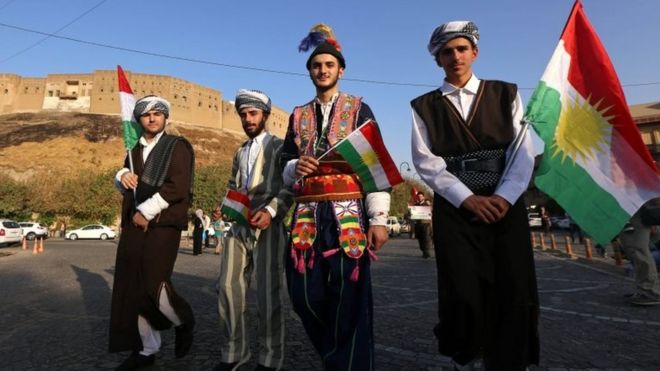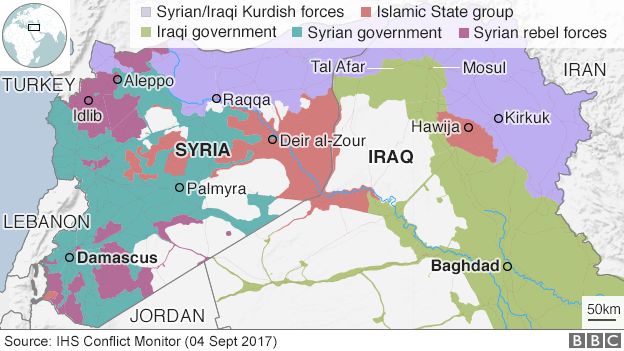 |
| The vote has left Iraq's neighbours nervous |
The Iraqi Kurdish parliament has voted to back an independence referendum in the face of opposition from across the globe.
The Kurdistan Regional Government, sitting for the first time in two years, backed the 25 September vote on Friday.
Iraq's central government rejected the referendum as unconstitutional on Tuesday.
Iran, Turkey and the US also object to the vote, fearing further instability.
The White House issued a statement hours after the vote, asking the Kurdistan Regional Government to call off the referendum and "enter into serious and sustained dialogue with Baghdad".
The statement warned the independence vote could "distract from efforts to defeat" the Islamic State militant group (IS).
But there was a feeling of jubilation amongst those who back the referendum.
"We've been waiting more than 100 years for this," Omed Khoshnaw, of the Kurdistan Democratic Party (KDR), told news agency Reuters.
Of the 111 MPs who sit in the regional parliament, 65 voted to go ahead with the plan.

However, more than 40 did not attend the sitting, according to local media. A number of opposition MPs had said they were planning to abstain.
Iraq's government has also authorised the prime minister to "take all measures" to preserve national unity.
Meanwhile, neighbouring Iran and Turkey - which both have Kurdish populations - fear a Yes vote will bolster separatism movements in their countries.
The US had suggested unspecified "alternatives" to the referendum ahead of Friday's meeting.
A move provoking division
Sally Nabil, BBC News, Irbil
The unanimous parliamentary decision to hold the referendum on independence has been met with wide celebrations in the Kurdish capital of Irbil. People took to the streets raising the Kurdish flags and chanting patriotic songs.
Some of them told me they feel proud because their long overdue dream of independence is finally coming true. They believe the parliamentary move legitimises the referendum, which is seen by the central government in Baghdad as unconstitutional.
International, as well as regional, powers like Turkey and Iran have also been very critical of the upcoming voting process, warning of serious repercussions. Both countries have relatively large Kurdish communities and they are afraid of the domino effect that such a referendum could have.
Even among Iraqi Kurds there are divisions. The Change Movement, the main opposition party, has boycotted the parliament session, saying it believes in independence but rejects holding the referendum at this stage.
Kurdish leader Massud Barzani said he would give a rapid response to the ideas, but appeared to have dismissed them when asked earlier on Friday, before the vote went ahead.
"We still haven't heard a proposal that can be an alternative to the Kurdistan referendum," he said.
Mr Barzani's statement was decried by Turkey's President Recep Tayyip Erdogan, who said the decision not to postpone was "very wrong", news agency Reuters reported.
The Iraqi Kurdish parliament has voted to back an independence referendum in the face of opposition from across the globe.
The Kurdistan Regional Government, sitting for the first time in two years, backed the 25 September vote on Friday.
Iraq's central government rejected the referendum as unconstitutional on Tuesday.
Iran, Turkey and the US also object to the vote, fearing further instability.
The White House issued a statement hours after the vote, asking the Kurdistan Regional Government to call off the referendum and "enter into serious and sustained dialogue with Baghdad".
The statement warned the independence vote could "distract from efforts to defeat" the Islamic State militant group (IS).
But there was a feeling of jubilation amongst those who back the referendum.
"We've been waiting more than 100 years for this," Omed Khoshnaw, of the Kurdistan Democratic Party (KDR), told news agency Reuters.
Of the 111 MPs who sit in the regional parliament, 65 voted to go ahead with the plan.

However, more than 40 did not attend the sitting, according to local media. A number of opposition MPs had said they were planning to abstain.
Iraq's government has also authorised the prime minister to "take all measures" to preserve national unity.
Meanwhile, neighbouring Iran and Turkey - which both have Kurdish populations - fear a Yes vote will bolster separatism movements in their countries.
The US had suggested unspecified "alternatives" to the referendum ahead of Friday's meeting.
A move provoking division
Sally Nabil, BBC News, Irbil
The unanimous parliamentary decision to hold the referendum on independence has been met with wide celebrations in the Kurdish capital of Irbil. People took to the streets raising the Kurdish flags and chanting patriotic songs.
Some of them told me they feel proud because their long overdue dream of independence is finally coming true. They believe the parliamentary move legitimises the referendum, which is seen by the central government in Baghdad as unconstitutional.
International, as well as regional, powers like Turkey and Iran have also been very critical of the upcoming voting process, warning of serious repercussions. Both countries have relatively large Kurdish communities and they are afraid of the domino effect that such a referendum could have.
Even among Iraqi Kurds there are divisions. The Change Movement, the main opposition party, has boycotted the parliament session, saying it believes in independence but rejects holding the referendum at this stage.
Kurdish leader Massud Barzani said he would give a rapid response to the ideas, but appeared to have dismissed them when asked earlier on Friday, before the vote went ahead.
"We still haven't heard a proposal that can be an alternative to the Kurdistan referendum," he said.
Mr Barzani's statement was decried by Turkey's President Recep Tayyip Erdogan, who said the decision not to postpone was "very wrong", news agency Reuters reported.
Source: BBCNews

No comments:
Post a Comment
Add a Comment...